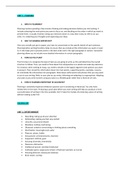UNIT 1 – PLANNING
1. WHAT IS PLANNING?
Planning involves spending a few minutes thinking and making decisions before you start writing. It
includes selecting the main points you want to focus on, and deciding on the order in which you want to
present them. It usually involves noting your decisions down in a way that is easy to refer to as you
write. It is collecting your thoughts and organizing your ideas.
2. WHY IS PLANNING IMPORTANT?
Once you actually put pen to paper, you have to concentrate on the specific details of each sentence.
Planning before writing therefore helps to ensure that you include all the information you want or need
to. It also helps you to present points in the best order and in the right paragraph or section. Successful
planning allows you to include more detailed information in certain paragraphs.
3. HOW DO YOU PLAN?
The first step is to recognize the type of text you are going to write, as this will determine the overall
structure to follow. Then, you need to think about the task/question as a whole and make key decisions.
For instance, when writing an essay, you need to decide on the logical argument and opinions you want
to present. Then, break this information down into main points, supporting points, examples, reasons,
etc and divide the information into paragraphs. Note down useful words and phrases that you may want
to use in your writing. Refer to your plan as you write, following and adapting it as appropriate. Adapting
your plan as you write involves using your plan as a flexible guide rather than a fixed set of rules.
4. HOW IS PLANNING IMPORTANT IN ADVANCED?
Planning is extremely important whatever question you’re answering in Advanced. You only have
limited time in the exam. Producing a quick plan before you start writing will help you produce a more
successful piece of writing in the time available. Don’t make the mistake of producing a piece of writing
without making a plan first.
VOCABULARY
UNIT 1: ENTERTAINMENT
• Absorbing: taking up all your attention
• Exhilarating: making you feel very excited
• Leisurely: casual and relaxed
• Mundane: ordinary and boring
• Obsessed: unable to avoid doing or thinking about something
• Worthwhile: meaningful and useful
• Pleasure: placer, hobby
• Amusement: entretenimiento, diversión
• Enjoyment: disfrute, gozo
• Amusing: divertido, entretenido
• Diversion: distracción
• Intellectual pursuit: actividad intelectual
• Icebreaker game: juego para romper el hielo (por ejemplo, yo nunca)
• Amusing diversion: distracción divertida
• Brain teaser: acertijo
,• Intellectual: intelectual
• Challenging: desafiante, complejo
• Game: juego
• Stressed/relaxed: estresado/relajado
• Liven up: pasarlo bien, animar (ex. Liven up the party→ animar la fiesta)
• Indulge: permitirse, consentir, dares el gusto
• Recreation: recreación, recreo
• Let off steam: desahogarse, liberar estrés, descargarse
• Unwind: relajarse
• Urge: deseo, ansia, necesidad
• Competitive nature
• Follow simple rules
• Get away with the exhausting routine
• To be not very demanding: no requiere mucho esfuerzo
• To have a nice time: pasar un buen rato
• To present= to put forward Ex. ,we are going to present two ideas = we are going to put
forward….
• Family oriented: orientado para las familias
, UNIT 2 – USING PARAGRAPHS
1. WHAT IS USING PARAGRAPHS?
Every Advanced writing text that you produce will need to be divided into paragraphs. Each paragraph
should contain at least one main point, together with relevant reasons, supporting details and examples
as appropriate. In the exam, to show you’re starting a new paragraph, make sure you leave a blank line
after the previous paragraph, and/or indent the first word of each paragraph.
*Consistency: →Visually, if you do something in one paragraph, you need to know it on the rest of them
(for example, if you indent the introduction, you need to indent the conclusion as well). <> in terms of
content=COHERENCE
2. WHY IS IT IMPORTANT?
A piece of writing without paragraphs is difficult for the reader to follow and understand. Using
paragraphs help the reader recognise when you’re moving onto a new point or idea. Paragraphs guide
the reader through the text, making your argument and logic easier to follow. Paragraphs make the
reading process easier for readers.
3. HOW DO YOU USE PARAGRAPHS?
The main work should be done in the planning stage. You need to decide how many paragraphs your
piece of writing needs – depending on the text type and how many points you wish you make – and
which points (together with reasons, examples, etc) will be included in each paragraph. Then when it
comes to writing, follow your plan. There is no a specific number of paragraphs on each text type.
4. HOW IS IT IMPORTANT IN ADVANCED?
Paragraphs are important in all text types to show you understand their conventions. In an essay,
paragraphs help the reader to follow your argument. In a letter/email, a review, report or proposal, you
want the reader to understand when you have moved on to a different aspect of the subject.
VOCABULARY
UNIT 2: DIY – FREE TIME TOPIC
• Enjoyable: agradable, divertido
• Experience:
• Imaginative: creativo
• DIY project
• Follow a set of instructions, manual or a guide
• Instruction manual.
• Tutorial
• Can’t contemplate doing smth: no considerar hacer algo
• Grasp sth: captar, entender
• Self-sufficient: autosuficiente
• Outline
• Guesswork: supposition
• Self-study: autodidacta, autodidactismo




